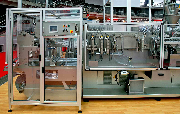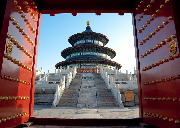At a recent UK Machine Builder conference, hosted by Mitsubishi Electric, strategies for entering Asia and China and building sustainable business were explored.
The rising wage and consumption levels in the developing economies of Asia, including China is opening up an enormous market to UK machine builders and automation engineers who can help them keep production costs down.
Until recently, the call for manufacturing automation and production machinery in Asia had been relatively modest. Now, however, with local labour rates increasing and domestic consumption growing, things are changing fast. In addition, senior figures of national government in China are giving way to new leaders who are charged with growing and developing the internal economy of the country.
Throughout Asia much of the recent economic development has been around coastal ports, which provide easy access to export markets. In China development has concentrated on the eastern seaboard, leaving the vast interior to follow in later years.
When people leave agriculture to work in new manufacturing industries, they also move into urban environments where they were unable to grow their own food. This results in them buying food and the rise of retail activities, which quickly develops into the consumption of other goods and services too. Thus demand for manufactured goods and consumables develops alongside the export side of the economy.
This has been apparent in the Asian economies, where wage levels have also increased. It was also inevitable that as industry developed it would be impossible for these countries to produce enough engineers, other professionals and skilled workers. In this way, Asia’s eventual need for automated production was predictable.
In a developing country there is inevitably some resistance to importing goods and services. Furthermore the amount of help available to companies for translations, currency exchange, tariffs, visas etc. will also be low and there is probably a culture of wanting to ‘buy local’. So in order to win business in Asia and China, overseas companies must have a strong USP (unique selling point) or specialism.
Robert Doak, a conference speaker from UK Trade & Investment (UKTI), says that British companies may have their own technical USP but that collectively they are also very good at combining products and service/support: “Some countries can supply excellent goods; others sell intellectual expertise. But few can achieve the goods and service mix of the UK. This is a tremendous strength for machine builders, whose goods will probably need commissioning, regular servicing and frequent redevelopment to adapt to changing end-user demands.”
Doak added: “There are many opportunities for SMEs, and once established in China a steady stream of work is likely to develop. Getting set-up initially can seem dauntingly complicated, but good initial research and exploratory visits are the first steps. Then there are layers of help available from UKTI, trade associations, business councils, export agencies, all of which are invaluable.”
 Another point raised by Doak was that many UK companies think only of China and forget its expansive neighbours, which also need the goods and services of international machine builders.
Another point raised by Doak was that many UK companies think only of China and forget its expansive neighbours, which also need the goods and services of international machine builders.
However, UK companies also need to think about how they are going to repatriate their money out from Asia and to make sure they are able to cope with currency fluctuations. There is also the issue of local regulations and protecting intellectual property rights.
Chris Evans looked at Mitsubishi’s position in Asia: “Mitsubishi Electric is the leading supplier of automation technologies in Asia, which means we offer a stable and locally accepted platform,” he says. “We are renowned for the quality of our products and have the infrastructure on the ground in Asia to support and service our equipment.”
Asia has been quick to adopt open standards for data communications (i.e. field devices from many different manufacturers connected to a common network). The preferred solution for this in the region is CC-Link, which has a dominant market share throughout Asia. This is not so surprising when you realise that CC-Link was developed in Japan, so is seen as the local choice. CC-Link was established as an open network 12 years ago and now has support from many global sensor and device manufacturers.
Evans also offered an insight into the way many UK based machine builders are thinking: “We are having conversations with many machine builders who maybe have not used our products as their first choice in the past but now realise the potential for business in China and throughout Asia and understand that partnering with Mitsubishi and having a Mitsubishi offering for their machines is very important to succeed in this region.”

